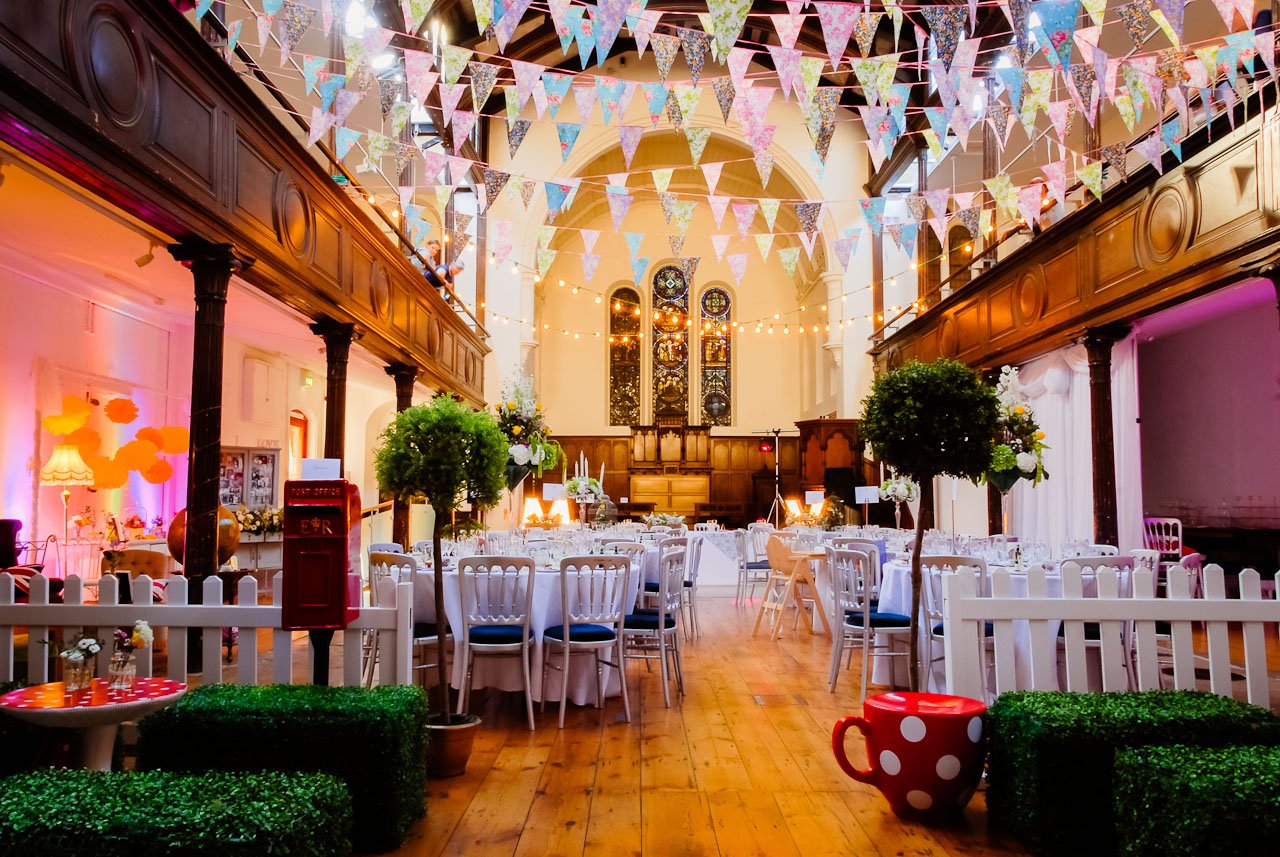
Wedding couples get creative free rein
Photo: Danni Beach
The art of not underselling
Fabrica in Brighton has raised extra income through venue hire for some years, but it needed a more commercial approach to maximise its potential. Anne Rupert tells the story.
When I first came to Fabrica in April last year, its venue hire operation stood out as a real strength. But after having quietly established a name for itself, it needed a bit more of a commercial focus to develop into a significant and reliable income stream. Like many arts organisations, earned income is increasingly important to our resilience, but operating in a commercial arena can be daunting.
Fabrica is Brighton and Hove’s centre for contemporary art, presenting three site-specific visual art installations each year, lasting about two months at a time. Our home is a beautiful grade II-listed former church in the centre of Brighton which is 200 years old this year. Fabrica has tapped into its potential for income generation for the last ten years or so, regularly hosting weddings, corporate events and parties. Over the years it had built up an excellent reputation for customer service with little or no active marketing – instead, word of mouth and the building’s quirky historic features spoke for themselves in attracting customers.
If you have a great venue and deliver a great service, make sure you charge market prices
I was hired for the new role of Business Manager specifically to maximise earned income. Fabrica has an excellent track record of attracting public funding, but biting public spending cuts, and now Brexit, means it is much more difficult to bid for public funds. We recently lost our long-standing funding from the local council so the spotlight is increasingly on commercial income.
A new approach
When I joined there were no profit targets or marketing plans to make sure we sold as many available slots as possible. We carried out a regular competitor review but our annual price increases were modest and did not capitalise on the venue and our offer. Still, we were making a respectable £18,000 profit each year, not insignificant for an organisation with a turnover of about £450,000.
Although I had worked in a corporate environment for many years, I am no sales and marketing genius. But having a strong base to go from, and a great new venue hire manager, we looked at our strengths, weaknesses and opportunities to develop a plan for maximising profit. I realised that we were operating in a few distinct markets, the wedding market being completely different from corporate events and Christmas parties.
Unique selling points
Our first challenge was to try and define our unique selling point for each market. Why would someone book an event with us rather than at the Grand Hotel, or the i360 (the futuristic ‘doughnut on a stick’ observation platform that has been proudly protruding from the seafront since 2016)? Our historic venue plays a strong role in all of the markets we operate in, but we offer more than that.
We allow wedding couples to completely personalise their event – we don’t tie them to any suppliers and they hire Fabrica as a blank canvas. Out of the weddings we’ve hosted recently, my favourite had an end-of-the-pier theme, comprising a fully homemade set with a coconut shy and helter-skelter perched on the chancel, and the biggest disco ball I have ever seen. Couples love this creative freedom, which is in keeping with the venue’s main purpose as a site-specific contemporary art gallery.
If you are looking at venue hire, consider what you have that others don’t. What might seem like drawbacks can actually be an advantage. We can only hire the venue out for about 13 weekend wedding slots per year around our exhibition programme, but this adds an exclusivity that sets us apart from many venues such as local hotels. And we are not shy about communicating the fact that profits directly contribute to our charitable activities.
A commercial product
With the USP established, it was clear that we’d been underselling ourselves. We implemented a substantial price increase for wedding hires immediately, and were delighted to find that it had no impact on bookings. The lesson here is that venue hire is a commercial product. If you have a great venue and deliver excellent service, make sure you charge market prices. We offer discounts to smaller organisations, but we’re much more confident at knowing what our offer is worth.
We also refreshed our marketing materials, as well as promoting venue hire more actively on social media. So far, we have yet to do any paid advertising. We’ve started networking more actively with local business organisations such as the Chamber of Commerce and Visit Brighton. We recently designed and launched a brand new Christmas party package and teamed up with the Chamber of Commerce for its Christmas social this year, meaning we’ll get lots of local businesses through the door.
We’re now on track to deliver over £31,000 profit this year. Next year, we hope this will be closer to £45,000, a respectable 10% of our annual turnover made up of reasonably predictable, unrestricted income. And we’re keen to explore new markets. Location hire is next on the list.
For organisations lucky enough to have their own venue, hiring it out can be a rewarding and lucrative business. Stay true to your organisational values and your brand identity as an arts organisation. This is often a strong selling point for people wanting something a bit different. And don’t be afraid to charge a premium.
Anne Rupert is Business Manager of Fabrica.
www.fabrica.org.uk
Tw @FabricaGallery
Join the Discussion
You must be logged in to post a comment.